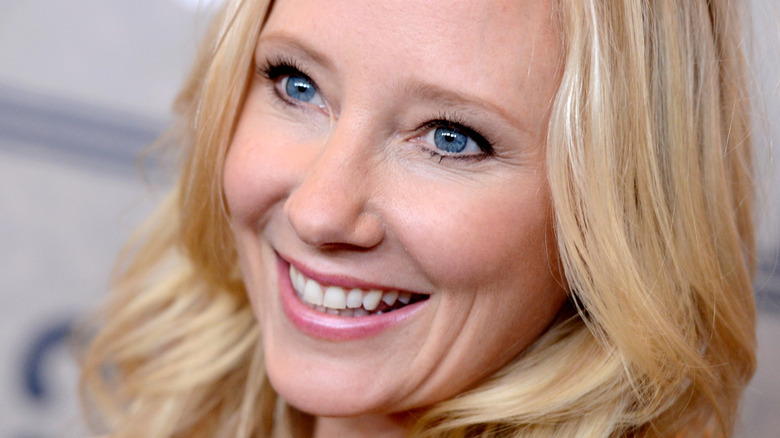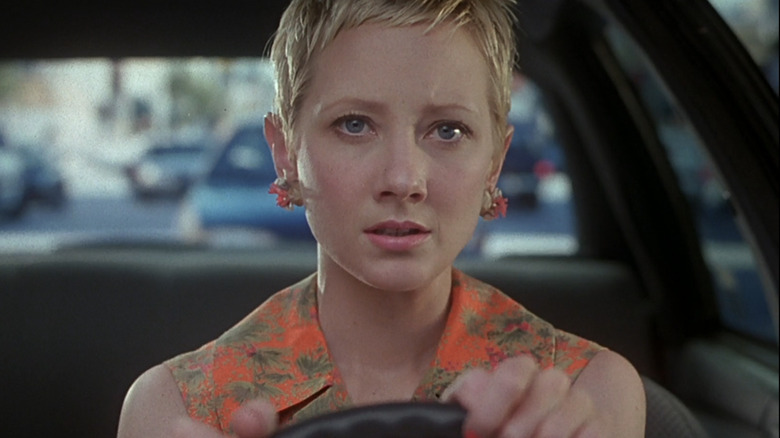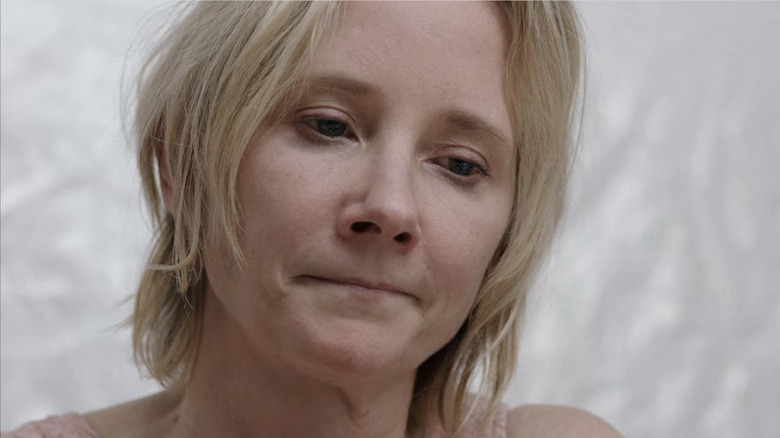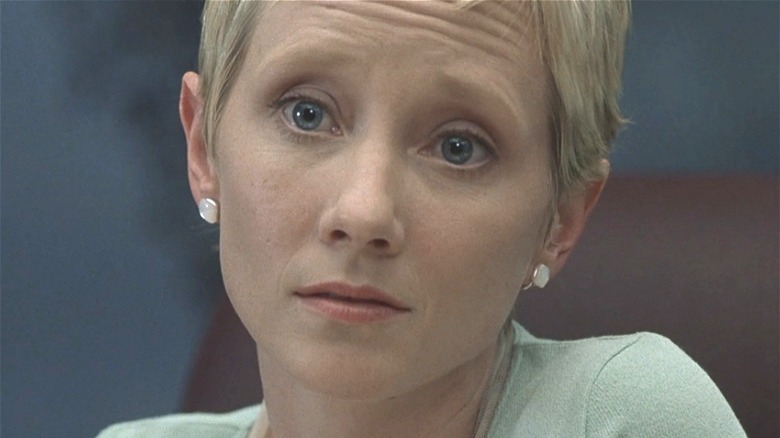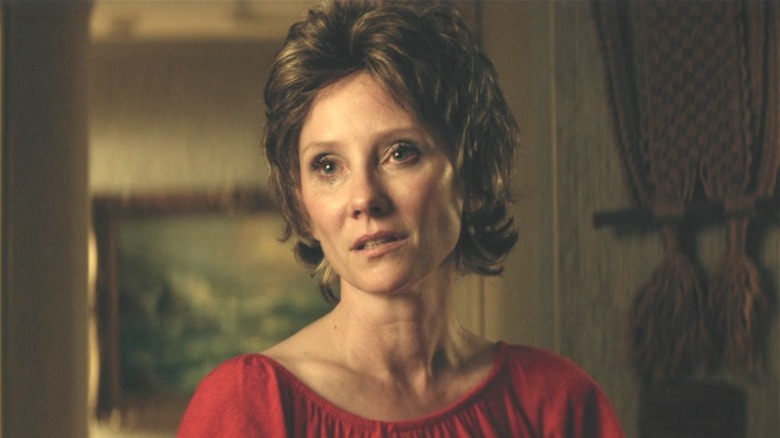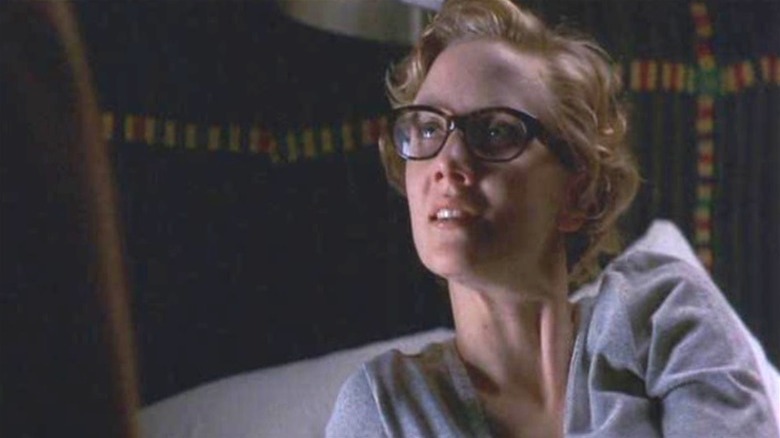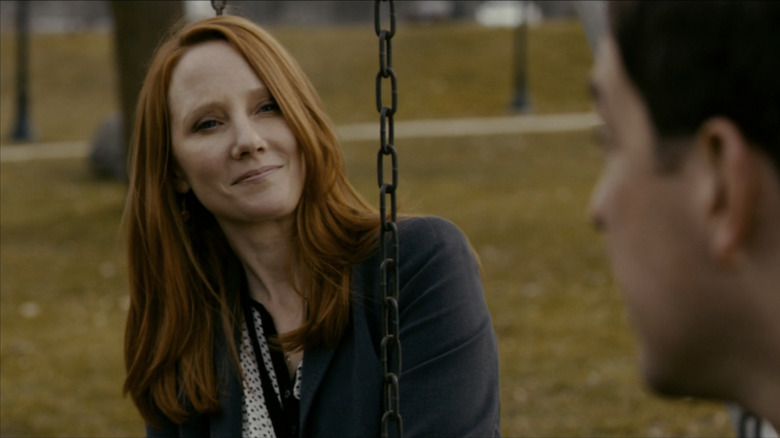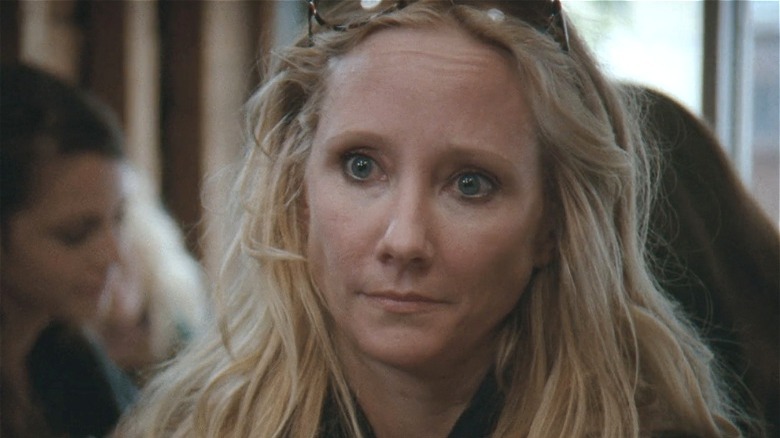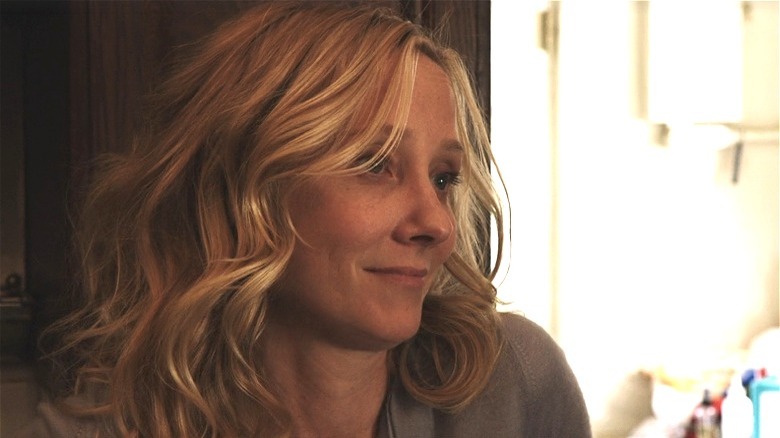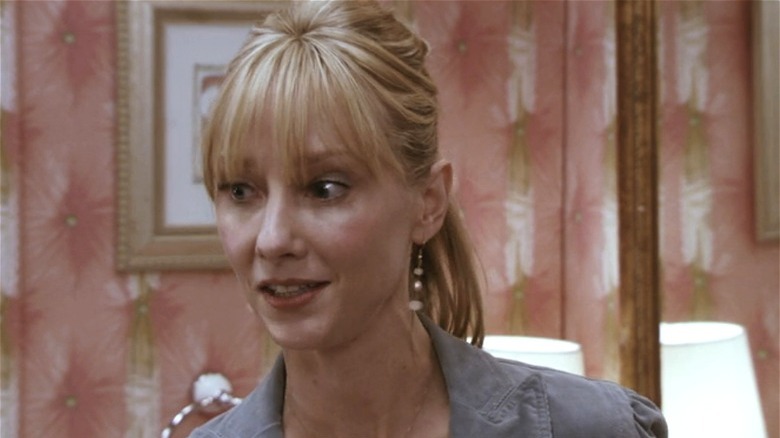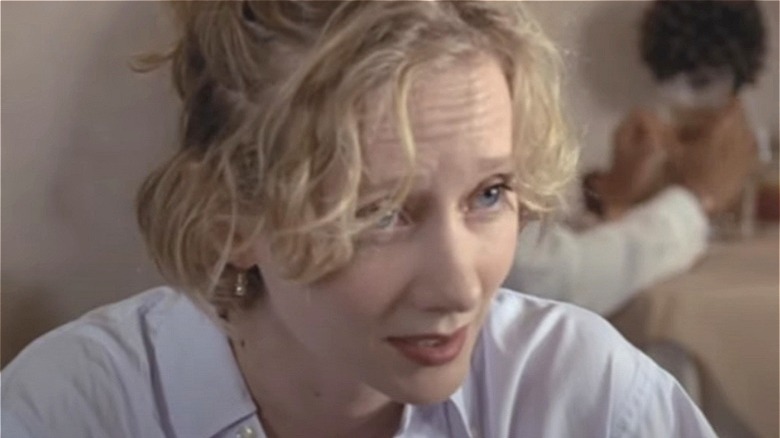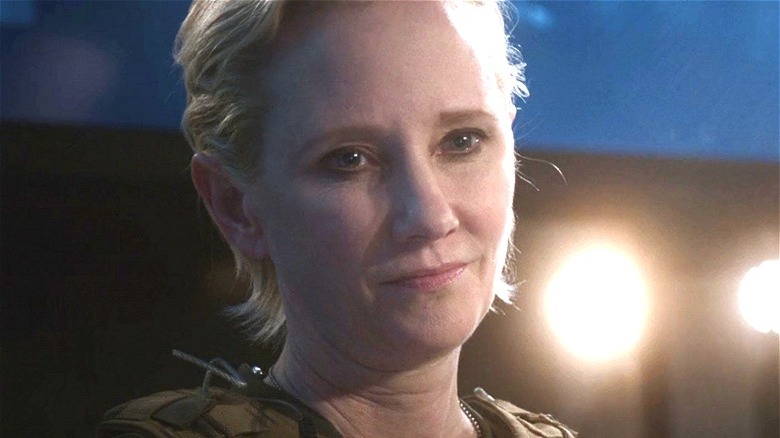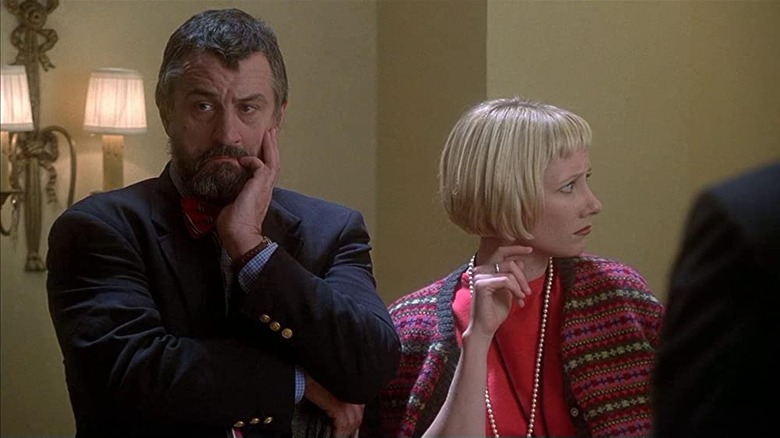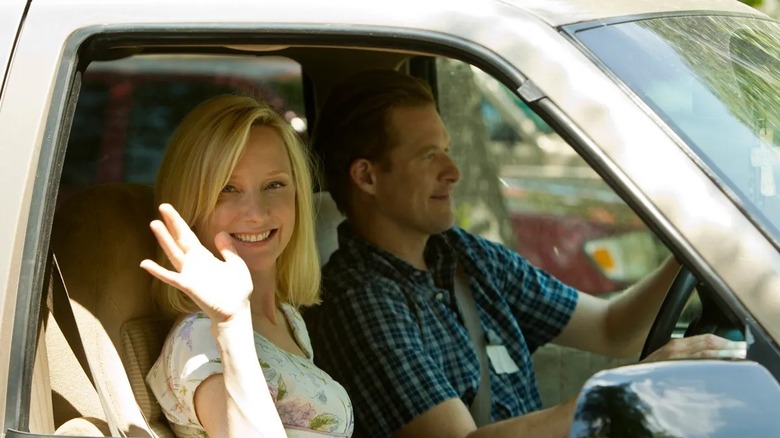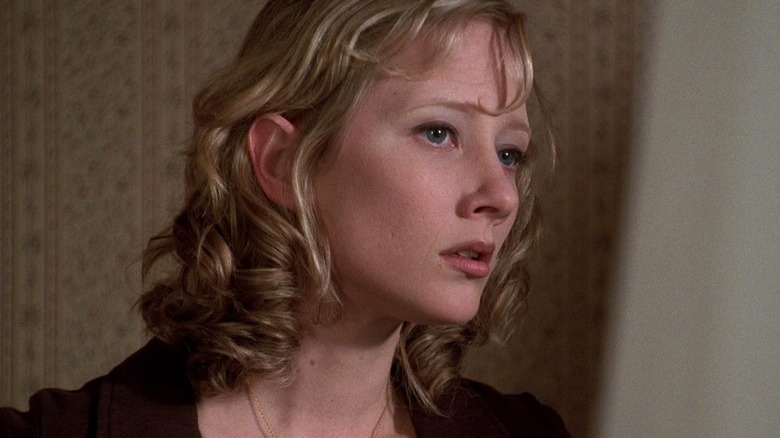Anne Heche's 7 Best And 7 Worst Movies Ranked
In August 2022, the film world was rocked by the death of actor Anne Heche after a severe car accident left her in a coma for several days. A gifted performer, Heche overcame an abusive and tumultuous childhood, and at age 17 joined the cast of the long-running soap opera "Another World." After four years on daytime TV she made a splash in the world of 1990s indie cinema, starring in films such as "Wild Side" with Christopher Walken and Joan Chen and the landmark HBO anthology film "If These Walls Could Talk." As her star rose, so did her notoriety, and her personal life and struggles with mental illness became tabloid fodder. Around the turn of the millennium, Heche was arguably more well known for her relationship with Ellen DeGeneres — and her erratic behavior after the relationship ended — than she was for starring in hits like "Volcano" and "Six Days, Seven Nights."
While Heche may have stepped out of the spotlight (or been pushed out by Harvey Weinstein), she never stopped working. In 2004, she was nominated for both an Emmy and a Tony Award, and in 2014 she co-created the short-lived NBC comedy "Bad Judge." At the time of her death, Heche had over half a dozen projects either in production or soon to be released, according to IMDb. She leaves behind a full body of work, and like any successful actor, some of her films are better than others. Let's take a look at the worst and best Anne Heche films.
Worst: Psycho
1998's "Psycho" is a curious film. At the time, director Gus Van Sant's decision to remake Alfred Hitchcock's 1960 horror classic almost shot-for-shot (albeit in color) was a head scratcher, and many years later it still puzzles. Wouldn't Van Sant have known that his film would suffer terribly in comparison to the original? Almost certainly. Does reproducing the same camera angles and movements from a four-decade-old film, not to mention most of the same dialogue, give the remake an off-putting, alien quality? It definitely does. Was that Van Sant's intention? Maybe.
As Marion Crane, the impulsive pencil-pusher who makes off with a stack of her boss' cash only to seal her fate by checking into the Bates Motel, Heche is a little more brittle and on edge than Janet Leigh was in the original, which isn't necessarily a bad thing considering the plot. The infamous shower scene is still effective, and the film killing off its main character (spoiler alert) at the halfway point, remaking itself into a different kind of film altogether, remains a twist for the ages. Heche's performance is actually pretty engrossing, but this remake was always doomed to fail — it was trashed by audiences and critics alike.
Best: Catfight
Many films have played on the idea of a polarized America in recent years, but one of the better ones is 2016's underseen dark comedy "Catfight." Veronica (Sandra Oh) and Ashley (Heche) are former college friends who run into each other decades later when Ashley is working as a caterer at a party for Veronica's wealthy husband. Long simmering tensions between the two erupt into the titular catfight, a childish term for what ends up being a brutal scrap that puts Veronica in a two-year coma. The film follows the shifting fortunes of these two women, who continue to meet and clash, to the point that whatever meaning they have in their lives comes from periodically beating the hell out of each other.
Writer-director Onur Tukel gilds the lily at times, punching up his scenes with incongruous music cues and over the top sound effects. However, he smartly stays out of the way of Oh and Heche, who give marvelous, gritty performances as women with little in common from the outside, but who share an insatiable desire to take their grievances out on someone else. Their fight scenes are unsparing and shockingly bloody, circling from funny to disturbing to funny again, finally settling somewhere in between.
Worst: John Q
Nick Cassevetes' overwrought hostage drama "John Q" wanted to be a "Dog Day Afternoon" for the new millennium, a film that attempts to expose the inequalities baked into American society. Hardworking family man John Quincy Archibald's (Denzel Washington) young son needs an emergency heart transplant, but when his insurance won't cover the life-saving procedure, he takes the entire ER hostage. As police gather outside, led by a sympathetic negotiator (Robert Duvall) and a showboating chief (Ray Liotta), John pleads his case to the surgeon who could help him (James Woods) and the coldhearted administrator (Heche) who is refusing to do so.
The film is so dedicated to making John a martyr to the cause of universal healthcare that it forgets to make him a compelling lead, relying on Washington's natural charisma to give shading to a two-dimensional character. The same could be said of nearly every actor here; the cast, which also includes Kimberly Elise as John's wife, is the very definition of "overqualified." Heche does what she can with her role, but the film's moral outrage requires her to be an unrepentant villain from beginning to end. The only thing she's missing is a mustache to twirl as she denies care to sick kids.
Best: My Friend Dahmer
A kind of real-life prequel, 2017's "My Friend Dahmer" presents serial killer Jeffrey Dahmer (Ross Lynch) as a high school senior in 1978 — just months before taking the first of 17 lives over the course of his gruesome killing spree — as seen through the eyes of a group of schoolmates who adopt the weird kid as a kind of mascot. Of course, they think of him as just being a bit odd, or awkward, or desperately uncool. No one sees him as a monster because they aren't looking for monsters; his parents (Heche and Dallas Roberts) fight constantly, but about their own issues, not about the fact that they've raised a son capable of such evil. It's only in retrospect that we see the signs that were there from the beginning: The home weight set he would use to kill his first victim, the collection of chemicals he uses to peel the skin off animals, his fundamental disconnect from other people.
Based on John Backderf's nonfiction graphic novel, Marc Meyers' dark, patient film considers Dahmer a product of his environment, but not a victim of it. He can't be explained away by the bullying he suffered, or his mother's mental illness, or his internalized homophobia. There is something evil and unknowable that pushes him toward violence and away from anyone who might have been willing to help. Lynch makes for an eerie and restrained Dahmer, while Heche is his opposite number, flamboyant and full of life, but too consumed by herself to see her son's humanity slipping away — if he had any to begin with.
Worst: The Juror
The preposterous 1996 legal thriller "The Juror" stars Demi Moore as Annie, a sculptor serving on the jury in the trial of a high-powered mobster. Enter The Teacher ("Cause when you see him, school's out," one wiseguy helpfully explains), a handsome, cultured psychopath played by Alec Baldwin, who takes Annie out to dinner and threatens her young son (Joseph Gordon-Levitt) unless she votes his boss not guilty. Annie does what she's told, but even after the trial ends The Teacher is not through with her, and soon Annie is fighting for her life in the jungles of Guatemala, for some reason.
Moore has little to offer here other than another nondescript variation on "resilient single mom," while Baldwin's Goodfella-meets-Hannibal-Lecter routine never quite matches the rest of the film. Heche is on hand as Juliet, Annie's best friend who is seduced and murdered by The Teacher in a particularly ugly and repellent scene. Before that, she has little to do other than provide dating advice to Annie and act as a sounding board for parts of the plot that the audience may have missed. James Gandolfini, just a few years away from his breakout role in "The Sopranos," gives perhaps the film's best performance in a small role as a sympathetic mobster.
Best: Cedar Rapids
Heche rarely got the chance to do comedy, and when she did, it was often of the acerbic kind. 2011's "Cedar Rapids" is an exception to that rule, a gloriously goofy film that imagines what "The Hangover" would look like if it had all its Las Vegas glitz replaced by Midwestern beige. Tim Lippe, a slice of Midwestern beige himself played by Ed Helms, is a small-town Wisconsin insurance salesman thrust into the debauched, high-stakes world of... a weekend convention in Cedar Rapids, Iowa. On the line is the Two Diamond Award, bestowed at the convention by the pious head honcho (Kurtwood Smith). But is Tim straight-laced enough to bring the award back to his Wisconsin office, or will the lures of the medium-sized city corrupt his soul?
Much of the film's humor comes from buttoned-up small towners who are scandalized by the smallest thing, and people investing their identities into activities and rewards that are modest, if not meaningless. Surrounding Helms are John C. Reilly as a hard-partying "Glengarry Glen Ross" type and Isiah Whitlock Jr. as a salesman almost as nerdy and repressed as Tim. Heche plays Joan, whose sweet burgeoning romance with Tim is complicated by the fact that she has a husband waiting at home. But the film is too warm and likes its characters too much to pass judgment on anyone. Heche and Helms have great chemistry, and "Cedar Rapids" — which is Certified Fresh with a score of 86% on Rotten Tomatoes — is as charming as it is funny.
Worst: That's What She Said
On the other end of the comedy spectrum from "Cedar Rapids" is the 2012 indie flick "That's What She Said," a film that seems to hate its characters (and audience) as much as the former film loved them. Heche and Marcia DeBonis star as Dee Dee and Bebe, lifelong friends and seen-it-all New Yorkers whose day is hijacked by Clementine (Alia Shawkat), a young woman who is spiraling after breaking up with her boyfriend. The three end up spending the day together, talking nonstop, getting thrown out of one establishment or another and constantly running afoul of the same unlucky coffee shop manager (Kate Rigg).
Like the dirty joke that gives the film its title, sex is the main topic of conversation. In theory, the fact that the women in the film can be so raunchy and free with their conversation should be liberating. The indie films of Kevin Smith and Neil LaBute, for example, made their names from male characters spouting nonstop about their sexual escapades; shouldn't women have a movie like that of their own? In practice, though, this means that nearly the only thing the characters — even the queer ones — ever discuss is men, and at such a manic, unchanging tempo that the film's 85 minute run time feels longer than it is. Heche is an unfortunate victim of Carrie Preston's direction, playing everything at the very top of her register.
Best: Rampart
According to its poster, Woody Harrelson plays "the most corrupt cop you've ever seen" in the 2011 film "Rampart," but that isn't entirely correct. LAPD officer Dave Brown is certainly corrupt in both his professional and personal lives, but as he patrols the streets of 1990s Los Angeles, there's little sense that the crimes he commits are for any discernible reason, like greed or even a sense of self-righteousness. He acts this way simply because it's his nature.
Directed by Oren Moverman and co-penned by the great crime writer James Ellroy, the film uses the real-life Rampart division corruption scandal of the late '90s as the backdrop of a character study. Harrelson and his character dominate every scene, and those around him are so used to it that it barely seems strange that, for instance, he is involved with both his wife (Cynthia Nixon) and her sister (Heche), or that his two daughters (including a young Brie Larson) have both of them as mothers, or that they all live together in a kind of de facto polygamy.
It's only after the wheels start to come off, when Dave is videotaped beating a suspect and the LAPD distances itself from him, that anyone dares to call him out — and that's when things really get interesting. This tense, critically acclaimed film is bolstered by several great supporting performances, with Heche's turn earning particular plaudits. The Los Angeles Times called her "terrifically moving" in the role of Catherine.
Worst: What Love Is
It's a good old fashioned battle of the sexes in Mars Callahan's awkwardly titled 2007 comedy "What Love Is." Tom (Cuba Gooding Jr.) plans to pop the question to his longtime girlfriend on Valentine's Day and has invited his four best friends (Callahan, Matthew Lillard, Andy Daly, and Sean Astin) over to celebrate his engagement. But when Tom finds a Dear John letter from his would-be fiancée, the engagement party becomes a pity party. He and the four bros get drunk and deliver monologues on their varying opinions on love, marriage, and women. The night takes a turn when five women (including Heche, Gina Gershon, and Tamala Jones) show up, invited by ladies' man Sal (Lillard), who thought this was a party party. Now evenly matched, the guys and girls hash out their differences and try to figure out, well, what love is.
Callahan seems to be trying to set a record for the world's fastest dialogue here. As the ladies freshen up in Tom's bright pink powder room, they burn through talking points about sexual double standards so quickly that they barely register as words being spoken. Once they join the party downstairs, each of the women gets paired up with one of the men, which results in Heche's good girl Laura getting pointers on sexual technique from Daly's Wayne, the only gay man in attendance. The film offers up little more than endless talking, which grows exhausting even before it sputters to a close, not ending so much as just stopping.
Best: Walking and Talking
Writer-director Nicole Holofcener's breakthrough feature "Walking and Talking" is as concerned with the small actions of everyday life as its title suggests — well, the everyday lives of upwardly mobile white Gen-Xers living in mid-90s New York, anyway. Laura (Heche) and Amelia (Catherine Keener) are childhood friends who are looking down the barrel of their 30s. Laura gets engaged to her mostly nice boyfriend (Todd Field) but contemplates an affair as the wedding date approaches, while Amelia splits her time with her ex-boyfriend (Liev Schreiber) and a smart, nerdy video store clerk (Kevin Corrigan).
The magic of the film is in how Holofcener builds her characters from the inside out, giving the sense that they existed before the film started and will continue to live on after it ends. The story is moved forward by the characters' inner lives more so than outside forces, and when Holofcener does introduce more traditional dramatic elements, she finds ways to move around them: A cancer scare turns out to be just that, and Laura works through her desire to cheat on her fiancé before anything physical ends up happening.
At its heart, "Walking and Talking" is a love story between two best friends, held up by two fantastic co-lead performances. This would be Heche's one and only time working with Holofcener, but in Keener the director found a collaborator, muse, and on-screen alter ego, making four films in a row together from 1996 to 2010.
Worst: Armed Response
There's a lot in the 2017 action/horror/sci-fi mashup "Armed Response" that doesn't make sense, but perhaps the most puzzling thing about it is why Anne Heche is in it. The film stars Wesley Snipes, which makes more sense; despite being a great actor and a bona fide action star, Snipes has been starring in these sort of direct-to-video cheapies for the better part of 15 years. Heche, on the other hand, starred in "My Friend Dahmer" and the NBC military drama "The Brave" that same year; she did not seem to be hurting for work. Perhaps one day she took a look at her filmography and realized that she had never played an anonymous grunt in a WWE-produced "Alien" rip-off.
When the government loses contact with a top secret military installation in Louisiana (clearly filmed in a newly constructed prison), career soldier Isaac (Snipes) puts together a crack team of commandos to investigate, including the scientist (Dave Annabel) who designed the AI program that the installation runs on. The film tosses red herrings one after the other, from a fugitive Middle Eastern terrorist to a cameo by KISS frontman Gene Simmons as a bald criminal. As spooky visions of dead children pop out of lockers, it becomes clear that the AI has become sentient and is punishing the team for its human rights violations while serving in Afghanistan. That still doesn't explain the arms that sometimes pop out of the walls to rip people in half, though.
Best: Wag the Dog
Did the first Gulf War actually happen? In Larry Beinhart's 1993 satirical novel "American Hero," he posits a scenario where George Bush uses a Hollywood producer to fake battle scenes for television in order to boost his approval ratings ahead of an election year. Five years later, director Barry Levinson and writer David Mamet adapted the novel as "Wag the Dog," which would be one of the great political satires of the last 50 years even if it hadn't come out at exactly the right time.
In the film, a Washington spin doctor (Robert De Niro) and White House aide (Heche) contact a Bob Evans-like Hollywood big shot (Dustin Hoffman). Their assignment: Produce a phony war with Albania in order to distract the public from a major sex scandal involving the president and an underage girl. Levinson, Mamet, and co-writer Hilary Henkin take aim at everything from film industry phonies, to the transformation of news into entertainment, to our tendency to canonize heroes before we know anything about them (predicting the Milkshake Duck phenomenon two decades early).
De Niro, Hoffman, and Heche all deliver Mamet and Henkins' dialogue brilliantly, and Levinson keeps the tone appropriately queasy, a cynical film for a cynical moment. When President Bill Clinton ordered bombing raids on Iraq in December 1998, many in the media accused him of "wagging the dog" in order to distract the public from his upcoming impeachment trial — which stemmed, of course, from a major sex scandal.
Worst: Nothing Left to Fear
On the far end of the horror spectrum from Gus Van Sant's "Psycho" is the 2013 shocker "Nothing Left to Fear," most notable as the first film produced by rock icon Slash, and for having a title that doubles as a review, which many critics amusingly noted. It stars James Tupper as Pastor Dan, a family man who moves his family across the country to take over a parish in Stull, Kansas. In real life, Stull is a tiny town near Lawrence whose cemetery is said to be haunted. In the film, however, Stull marks the literal gates of Hell, and soon Pastor Dan, his wife Wendy (Heche), and his three kids are caught up in the town's efforts to open those gates and unleash evil upon the world.
The film takes on a hodgepodge of influences, from the breadbasket cult of "Children of the Corn" to youngest child Mary's (Jennifer Stone) possession by a deadly demon, which borrows from "The Exorcist" and "The Ring" in equal measure. Eldest daughter Rebecca (Rebekah Brandes) has a romance with a local hunk (Ethan Peck) who ends up being too bland to be evil. Tupper makes little impression as Pastor Dan, while Heche has so little to do that her part may as well not exist; the two stars were in a long-term relationship at the time, and it's tempting to think that one of them took their role as a favor to the other.
Best: Donnie Brasco
It's 1970s New York and old-time mobster Lefty (Al Pacino) shows the new kid Donnie (Johnny Depp) how to be a wiseguy. A wiseguy doesn't pay for drinks; a wiseguy carries his money in a roll, not a wallet. What Lefty doesn't know, however, is that "Donnie" is actually Joseph Pistone, an FBI agent gone deep undercover to infiltrate the mafia. In Mike Newell's film "Donnie Brasco," the good times of being a mobster in America — if there ever were any — are long gone. There's no "Goodfellas"-style adrenaline rush to the life, no family honor like in "The Godfather." Everything is a slog through an eternally gray, cold city, with the threat of violence always in the air like cigarette smoke. As Joseph's life crumbles around him, he turns more and more to "Donnie," and to his mentor Lefty, for meaning.
Heche plays Joseph's wife Maggie, left alone for weeks on end with three daughters and no idea where her husband is or what he is doing. Supposedly that's for her own protection, but it certainly doesn't feel like it. The role, like many others in the film, reads like a stereotype on the page, but Heche brings Maggie to life in her handful of scenes. It's the kind of performance that she was knocking out on a regular basis in major studio films for those last few years of the '90s, the kind that she was always able to give, even after those big movie opportunities dried up.
